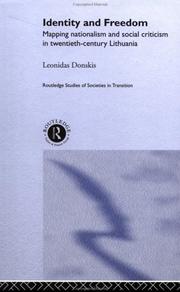| Listing 1 - 10 of 24 | << page >> |
Sort by
|
Book
ISBN: 9781433101250 Year: 2008 Volume: 39 Publisher: New York Washington Berne : Peter Lang,
Abstract | Keywords | Export | Availability | Bookmark
 Loading...
Loading...Choose an application
- Reference Manager
- EndNote
- RefWorks (Direct export to RefWorks)
Machiavel (1469-1527) --- Vico, Giambattista (1668-1744) --- Shakespeare, William (1564-1616) --- Cervantes Saavedra, Miguel de (1547-1616) --- Zamâtin, Evgenij Ivanovič (1884-1937) --- Huxley, Aldous (1894-1963) --- Orwell, George (1903-1950) --- Miłosz, Czesław (1911-2004) --- Kundera, Milan (1929-....) --- Philosophie politique --- Utopies --- Critique et interprétation --- 16e-20e siècles
Book
ISBN: 9789042032774 Year: 2011 Volume: 226 Publisher: Amsterdam Rodopi
Abstract | Keywords | Export | Availability | Bookmark
 Loading...
Loading...Choose an application
- Reference Manager
- EndNote
- RefWorks (Direct export to RefWorks)

ISBN: 0415270863 Year: 2002 Volume: 18 Publisher: London ; New York : Routledge,
Abstract | Keywords | Export | Availability | Bookmark
 Loading...
Loading...Choose an application
- Reference Manager
- EndNote
- RefWorks (Direct export to RefWorks)
Nationalism --- Nationalisme --- History --- Histoire --- Kavolis, Vytautas, --- Shtromas, Alexander, --- Venclova, Tomas, --- Santara-Sviesa (Organization) --- Lithuania --- Lituanie --- Social conditions --- Conditions sociales
Book
ISBN: 9789044136258 9044136259 Year: 2018 Publisher: Antwerpen Garant
Abstract | Keywords | Export | Availability | Bookmark
 Loading...
Loading...Choose an application
- Reference Manager
- EndNote
- RefWorks (Direct export to RefWorks)
Persoonlijke beschouwingen over kunst, politiek en Europa.

ISBN: 9401201714 1423789091 9781423789093 9789401201711 9042017279 9789042017276 Year: 2005 Publisher: Amsterdam New York Rodopi
Abstract | Keywords | Export | Availability | Bookmark
 Loading...
Loading...Choose an application
- Reference Manager
- EndNote
- RefWorks (Direct export to RefWorks)
Loyalty and betrayal are among key concepts of the ethic of nationalism. Marriage of state and culture, which seems the essence of the congruence between political power structure and collective identity, usually offers a simple explanation of loyalty and dissent. Loyalty is seen as once-and-for-all commitment of the individual to his or her nation, whereas betrayal is identified as a failure to commit him or herself to a common cause or as a diversion from the object of political loyalty and cultural/linguistic fidelity. For conservative or radical nationalists, even social and cultural critique of one's people and state can be regarded as treason, whereas for their liberal counterparts it is precisely what constitutes political awareness, civic virtue, and a conscious dedication to the people and culture. "This book is the first attempt to provide a discursive map of Lithuanian liberal and conservative nationalism. Analyzing the works and views of dissenters and critics of society and culture, we can reveal a mode of being of liberal nationalism as a social and cultural criticism. This volume is of interest for intellectual historians, social theorists, students of East-Central European thought, and anyone interested in Baltic studies and the new members of the EU. Dissent: act of betrayal, or loyalty? Leonidas Donskis' new remarkable study is one consistent, thorough and dedicated effort to provide an answer to that question." - Zygmunt Bauman (from the Preface).
Nationalism --- Lithuania --- Politics and government. --- Nationalism. --- Consciousness, National --- Identity, National --- National consciousness --- National identity --- International relations --- Patriotism --- Political science --- Autonomy and independence movements --- Internationalism --- Political messianism
Book
ISBN: 9401208174 9789401208178 9789042035430 9042035439 Year: 2012 Volume: v. 252 Publisher: Amsterdam Editions Rodopi
Abstract | Keywords | Export | Availability | Bookmark
 Loading...
Loading...Choose an application
- Reference Manager
- EndNote
- RefWorks (Direct export to RefWorks)
Much of the debates in this book revolves around Milan Kundera and his 1984 essay “The Tragedy of Central Europe.” Kundera wrote his polemical text when the world was pregnant with imminent social and political change, yet that world was still far from realizing that we would enter the last decade of the twentieth century with the Soviet empire and its network of satellite states missing from the political mappages Kundera was challenged by Joseph Brodsky and György Konrád for allegedly excluding Russia from the symbolic space of Europe, something the great author deeply believes he never did. To what extent was Kundera right in assuming that, if to exist means to be present in the eyes of those we love, then Central Europe does not exist anymore, just as Western Europe as we knew it has stopped existing? What were the mental, cultural, and intellectual realities that lay beneath or behind his beautiful and graceful metaphors? Are we justified in rehabilitating political optimism at the beginning of the twenty-first century? Are we able to reconcile the divided memories of Eastern or Central Europe and Western Europe regarding what happened to the world in 1968? And where is Central Europe now?
Civilization. --- Politics and government. --- Barbarism --- Civilisation --- Auxiliary sciences of history --- Culture --- Kundera, Milan --- Kundera, Milan. --- Kountera, Milan --- Кундера, Милан --- קונדרה, מילן --- كوندرا، ميلان --- Criticism and interpretation. --- Since 1989 --- Heisei Period (Japan) --- Europe, Central --- Europe, Central. --- History. --- 쿤데라, 밀란 --- クンデラ, ミラン
Book
ISBN: 3869456078 9783869456072 9783883098005 3883098000 9783883097992 3883097993 Year: 2013 Publisher: Nordhausen : Bautz,
Abstract | Keywords | Export | Availability | Bookmark
 Loading...
Loading...Choose an application
- Reference Manager
- EndNote
- RefWorks (Direct export to RefWorks)
Happy are those epochs that had clear dramas, dreams, and doers of good or evil. Today technology has surpassed politics, the latter having in part become a supplement to technology and threatening to bring the creation of a technological society to completion. This society with its determinist consciousness regards a refusal to participate in the technological innovations and social networks (so indispensable for the exercise of social and political control) as sufficient grounds to remove all those who lag behind in the globalization process (or have disavowed its sanctified idea) to the mar
Political science --- Administration --- Civil government --- Commonwealth, The --- Government --- Political theory --- Political thought --- Politics --- Science, Political --- Social sciences --- State, The --- Philosophy --- Donskis, Leonidas --- Donskis, L. --- Donskis, Leonidas, --- Europe, Eastern --- East Europe --- Eastern Europe --- Politics and government
Book
ISBN: 9783869456874 3869456876 9783883098838 Year: 2014 Publisher: Nordhausen
Abstract | Keywords | Export | Availability | Bookmark
 Loading...
Loading...Choose an application
- Reference Manager
- EndNote
- RefWorks (Direct export to RefWorks)
Leonidas Donskis Essay ist eine Kritik von Ideologie und Utopie. Die grundlegende These lautet, dass beide immer schon notwendige Ergänzungen der historischen und kulturellen Einbildungskraft waren, so dass das Böse nicht der Ideologie oder Utopie per se entspringt, sondern dem Versuch, sie eins zu eins in die gesellschaftliche Realität zu übersetzen. Die Kritik des Ideologischen und Utopischen erarbeitet Donskis vor der Folie der im zwanzigsten Jahrhundert vorherrschenden Auffassungen von Moral und Kulturkritik - im Kontext von Zivilisationsanalyse und Bewusstseinsgeschichte und in einer erhe
Culture --- Moral conditions --- Morals --- Social history --- Social norms --- Philosophy.
Book
ISBN: 3034303351 9783034303354 Year: 2009 Publisher: Bern: Peter Lang,
Abstract | Keywords | Export | Availability | Bookmark
 Loading...
Loading...Choose an application
- Reference Manager
- EndNote
- RefWorks (Direct export to RefWorks)
Baltic States --- Baltic States --- Baltic States

ISBN: 9789004493469 9789042010666 Year: 2003 Publisher: Leiden; Boston : BRILL
Abstract | Keywords | Export | Availability | Bookmark
 Loading...
Loading...Choose an application
- Reference Manager
- EndNote
- RefWorks (Direct export to RefWorks)
This book analyzes such symbolic designs of the modern troubled imagination as the conspiracy theory of society, deterministic concepts of identity and order, antisemitic obsessions, self-hatred, and the myth of the loss of roots. It offers, among other things, the unique East-Central European materials incorporated in a broad, imaginative synthesis and critique of contemporary social analysis.
Group identity --- Hate --- Social conflict --- Political aspects
| Listing 1 - 10 of 24 | << page >> |
Sort by
|

 Search
Search Feedback
Feedback About UniCat
About UniCat  Help
Help News
News